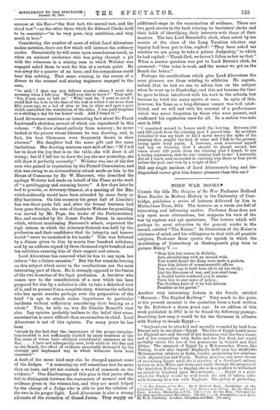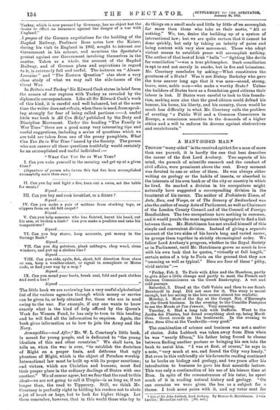MORE WAR BOOKS.*
UNnen the title Tho Origins of the War Professor Holland Rose, Reader in Modern History in the University of Cam- bridge, publishes a series of lectures delivered by him in Michaelmas Term, 1914. The lectures as a whole are full of interesting and informing matter. Professor Rose does not rely upon mere abstractions, but supports his view of the war by copious and apt quotations. The lecture which will perhaps he most attractive to the general reader is the second, entitled "The Kaiser." In illustration of the Kaiser's alertness of mind, and his willingness to deal with all possible subjects, Professor Rose quotes the speech in which the Archbishop of Canterbury in Shakespeare's play tries to picture Henry V.:— " Hear him but reason in divinity,
And, all-admiring with an inward wish, You would desire the King were made a prelate, Hear him debate of commonwealth affairs You would say it hath been all in all his study i List his discourse of war, and you shall hear A fearful battle rendered you is Turn him to any cause of policy,
The-Gordian knot of it he will unloose Familiar as his garter."
Another• very interesting lecture is the fourth, entitled "Morocco The Bagdad Railway." Very much to the point et the present moment is the quotation from a hook written by Dr. Robrbech (1. dozen years ag,o. In an edition of this work published in 1911 is to be found the following passage, describing how easy it would be for the Germans in alliance with Turkey to invade Egypt:— " England can be attacked and mortally wounded by land from Europe only in one place—Egypt. The less of Egypt would mean for England not only the end of her dominion over the Suez Canal, and of her connections with India and the Far Feat, but would probably entail the loss of her possessions in Central and East Africa. The conquest of Egypt by a Mohenenseden Power, like Turkey, would also imperil England's hold over her 60,000,000 Mohammedan subjects in India, besides prejudicing her relations with Afghanistan and Persia. Turkey, however, can never dream of recovering Egypt until she is mistress of .a developed railway, system in Asia Minor and Syria, and until, through the progress of the Anatolian Railway to Bagdad, she is in a position to withstand an attack by England upon Mesopotamia.. . . Egypt is a prize which for Turkey would be well worth the risk of taking sides with Germany in a war with England. The policy of protecting • (1) The Origins of the War. By J. Holland Erne. Cambridge : at the Univereity Pres,. [2a. ed. net.]—(21 Butain out •lbrkeg. By Sir Edward Cook. London: Macmillan nod Co. [2d.]—(3) AU Coo Help. Enbliabed by the Duty and Discipline Movement. [6d. net —(4) Aratogeddrot--and dfte, By W. L. Courtney. London: Clutptaan and Hall. Ps. net.] Turkey, which is now pursued by Germany, has no object but the ,desire to effect an insurance against the danger of a war with England."
A propos of the German negotiations for the building of the
• Bagdad Railway, Professor Rose notes how the Kaiser, -during his visit to England in 1902, sought to interest our Government in his scheme, and mentions the Spectator's protest against our Government involving themeolves in the matter. Taken as a whole. the account of the Bagdad Railway, and of German plans and aspirations in regard to it., is extremely full and useful. The lectures on "Alsace. . Lorraine" and "The Eastern Question" also show a very close study of what we may call the side-issues of the Great War.
In Britain and Turkey?. Sir Edward Cook states in brief form the causes of our rupture with Turkey as revealed by the diplomatic correspondence. Like all Sir Edward Cook's work ',of this kind, it is careful and well balanced, but at the same time the writer does not refrain, when there is need, from speak- ing strongly for fear of being called partisan—A. useful little war book is AU Can Help,, published by the Duty and Discipline Movement. Under the heading "The Family in War Time " there are a good many very interesting tips and ',useful suggestions, including a series of questions which we are told are taken from one of the penny pamphlets, What Can You Do in War Time ? issued by the Society. The person who can answer all these questions truthfully would certainly Ire an accomplished and useful individual :— "WHAT CAN' Yoe Do IN WAR TINE?
I. Can you wake yourself in the morning and get up at a given time
• (Signature of person who knows this test has tens accomplished successfully more than once.)
IL Can you lay and light a fire, turn out a room, set the table fee meals ?
Signed
III. Can you buy and cook breakfast, or a dinner
Signed
IV. Can you make a pair of mittens from stocking tops, or slippers from an old felt carpet?
Signed
V. Can you help someone who has fainted, burnt his hand, cut his arm, or broken a limb ? Can you make a poultice and take his temperature?
Signed
VI. Can you buy stores, keep accounts, put money in the Savings Bank?
Signed VII. Can you dig potatoes, plant cabbages, chop wood, clean windows, and put up a clothes line
Signed
VIII. Can you ride, cycle, fish, shoot, tell direction from stars or sum keep a weather-chart, or signal in semaphore or Morse code, or find your way by a map ?
Signed
IX. Can you mend your boots, break coal, fold and pack clothes and cord a box?
Signed
The little book we are reviewing has a very useful alphabetical dist of the various agencies through which money or service can be given to, or help obtained for, those who are in need owing to the war. For example, if any one wants to know .exactly what is the kind of help offered by the Queen's Work for Women Fund, he has only to turn to this beading and he will find all the information he requires. Again, the book gives information as to how to join the Army and the Navy.
Armageddon—and After,' Mr. W. L. Courtney's little book, is meant for young people, and is dedicated to "the young idealists of this and other countries." We shall have, he tells us, when the war is over, "to establish the doctrines of Right on a proper basis, and dethrone that ugly phantom of Might, which is the object of Potsdam worship. International law must be built up with its proper sanctions ; and virtues, which are Christian and humane, most find their proper place in the ordinary dealings of States with one -another." We of course agree, but we fear that the road to this ideal—we are not going to call it Utopia—is as long as, if not longer than, the road to Tipperary. Still, we think Mr. -Courtney is perfectly right in bidding his readers not to abate a jot of heart or hope, but to look for higher things. Let them remember, however, that in this world those who try to do things on a small scale and little by little of'en accomplish far more than those who take as their motto, "All or nothing." We, too, desire the building nip of a system of international law ; but we are quite certain that it cannot be done quickly, but only by taking an infinity of pains and being content with very slow movement. Those who adopt violent means to establish peace will accomplish nothing. The author of that best of Irish "bulls "—" fighting like devils for conciliation "—was a true philosopher. Such conciliation is apt to end not merely in smoke, but in fire and brimstone. Mr. Courtney concludes by asking—What constitutes the greatness of a State ? Was it not Bishop Berkeley who gave the true answer long ago that it was men—sound, strong, brave, sane, noble men—who make a worthy State ? Unless the builders of States have as a foundation good citizens their labour is lost. If States were careful to look to this founda- tion, making sure also that the good citizen could defend his honour, his home, his liberty, and Isis country, there would be much less difficulty in what Mr. Courtney calls the problem of creating "a Publio Will and a Common' Conscience in Europe, a conscience sensitive to the demands of a higher ethics and a. will to enforce its decrees against obstruetives and recalcitrants."



















































 Previous page
Previous page